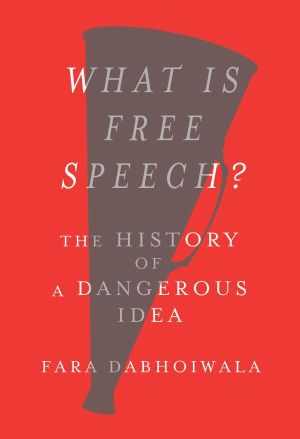
A brilliant history of a weaponized mantra. - The Guardian
A leading intellectual historian shows how free speech, once viewed as both hazardous and unnatural, was reinvented as an unalloyed good, with enormous consequences for our society today.
Every premodern society, from Sumeria to China to seventeenth–century Europe, knew that bad words could destroy lives, undermine social order, and create political unrest. Given the obvious dangers of outspokenness, regulating speech and print was universally accepted as a necessary and proper activity of government. Only in the early 1700s did this old way begin to break down. In a brief span of time, the freedom to use words as one pleased was reimagined as an ideal to be held and defended in common.
There could be no better guide [to free speech] than Fara Dabhoiwala... Every chapter... makes you think afresh about the subject. -- Ferdinand Mount *London Review of Books*
Excellent... the real lesson of this book is that fights about free speech are almost always proxies for something else. -- David Runciman *BBC History Magazine*
Tracing a global history of speaking freely is no small task. Dabhoiwala tracks the vicissitudes of the idea with gusto, through religious prohibitions (heresy and blasphemy), monarchical edicts (sedition, abolished in Britain in 2009), colonial suppression of slave speech, and the perennial existence of what our betters now call 'misinformation', which takes giant leaps forwards (or backwards) in the era of printing, newspapers and the internet. -- Nina Power *The Telegraph*
A rich and wide-ranging history which reminds us that disagreement over what may be printed or said in public has long been ferocious... [and] confirms how most arguments over speech are arguments at the same time about something else. -- Edmund Fawcett *Financial Times*
Fara Dabhoiwala's remarkable global history of free speech is written with wit, fluency, and dazzling erudition. Constantly surprising, and full of subtlety and nuance, it reveals what a new and innovative idea free speech was when it was first upheld as a civilized goal in the eighteenth century-and how many extraordinary twists and turns it has taken ever since, into the present. Examining who in history could speak and who was silenced, Dabhoiwala reminds us of the crucial relationship between speech and power. Eye-opening, thought-provoking, and deeply enjoyable, What Is Free Speech? is a work of great profundity and brilliance. -- William Dalrymple, author of The Golden Road
This is a magisterial cultural and comparative history of the idea of free speech. Loaded with novel insights on almost every page, this book is meticulously documented with original and frequently surprising research on countless previously unexplored topics. -- Frederick Schauer, author of Free Speech: A Philosophical Inquiry and Thinking Like a Lawyer